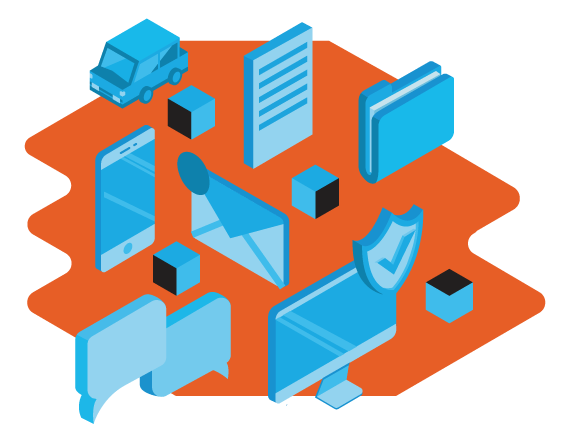Maternity Lactation Month
Promoting healthy infant diet.
Babies and toddlers need a good start. For this reason, during August we celebrate Maternity Lactation Month. By definition, lactation is the process of breastfeeding or feeding breast milk to an infant. According to the Pan American Health Organization (PAHO), a poor diet during the early stages of life can cause damage to the growth and development of the infant’s brain. It is very important to make sure that newborns have a healthy diet, especially in the early years.
According to the American Academy of Pediatrics (AAP), it is recommended that babies be fed only breast milk for the first six months of life and then combine breastfeeding with other healthy foods until the first year or two of age. The benefits of breast milk will be seen no matter how long the lactation period lasts. However, it has been proven that the longer you feed a child with breast milk, the greater the benefit.

Learn More About Breastfeeding
Breast milk benefits not only the child, but also the family and the community in general. In fact, PAHO indicates that universal breastfeeding would save $302 billion dollars a year due to the increase in IQ that would occur in the population.
Breast milk is known as a superfood, making it the best source to feed a newborn. It has the right amounts of sugar, protein, fat, digestive protein, minerals, vitamins and hormones that babies need. In addition, it acts as a first vaccine, providing you with antibodies that help prevent certain diseases.
Some Benefits for the Baby
- Reduces the risk of childhood leukemia.
- Reduces the risk of sudden infant death syndrome by 60%.
- Improves cognitive development and IQ indicators.
- Protects against infections, allergies and gastrointestinal diseases, among others.
- Reduces overweight by 13% and childhood type 2 diabetes by 35%.
- Promotes a healthy emotional development.
- Prevents tooth decay.
Benefits for the Mother
- Reduces the risk of excessive weight gain.
- Delays the onset of menstrual periods.
- Reduces the risk of type 2 diabetes by 32%.
- Reduces the risk of breast cancer by 26%.
- Reduces the risk of ovarian cancer by 37%.
- Reduces the risk of osteoporosis.
- Reduces the risk of cardiovascular disease.
- Avoids expenses on formula milk.
Benefits for the Community
- Reduces environmental pollution caused by the production and transportation of formula milk.
- Reduce packaging and supply waste.
- It is associated with greater economic stability.
- It is associated with a higher level of education.
- It is associated with greater socio-economic development.
Interesting Facts
- The WHO records:
- 72% of countries have less than 14 weeks of maternity leave, which can affect the rate of breastfed babies.
- According to UNICEF:
- Nearly 77 million newborns are not breastfed within the first hour of birth, depriving them of essential nutrients to protect them from disease.
- Babies who are not breastfed at all are 14 times more likely to die than those who are exclusively breastfed.
A Call to Action
To achieve a consistent breastfeeding process, each family must have the time and space to get to know their baby and learn how to feed them properly. We can all be supportive during the breastfeeding process, we just have to show empathy and provide the necessary support. We must help all families so that they have the opportunity to work and continue their process of feeding with breast milk at the same time.
Breastfeeding and Work
In the vast majority of cases, lactating mothers will be able to continue breastfeeding their infants after returning to work without major complications. The most important thing is to plan and involve all family members, who will be of great support.
In the United States and Puerto Rico, there are legal protections that provide nursing mothers with the security of being able to continue their breastfeeding process for up to one year after the birth of the child. If you live in another region, it is likely that there are also pro-breastfeeding policies at the national or institutional level. Check with your employer to see if they have any such policies and which ones apply to their jurisdiction.
Recommendations for the Mothers
Before resuming your work functions, consider the following recommendations:
- Establish an action plan that includes:
- Estimated hours of care / separation of the baby
- Extraction and storage of the breast milk
- Resources, supplies and materials needed
- Inform yourself with the human resources personnel
- Familiarize yourself with the process of expressing breast milk
- Create a breast milk bank
- Acquire a cooler and containers to store and transport breast milk
Recommendations for Workplace
Each company can support families in the breastfeeding process through policies and an organizational culture focused on well-being. To the extent that we become aware of the importance of breastfeeding, we can contribute to improving the quality of life in our communities. According to UNICEF, companies with a lactation support program can save an average of $3 dollars for every dollar they invest. In addition, supporting these initiatives gives value to your investment, resulting in greater commitment and job satisfaction, as well as improving the corporate image.
- Consult with your legal team regarding the laws applicable to nursing mothers.
- Ask the mother if they need any additional support to ease the process of returning to work.
- Promote the benefits of breastfeeding to all staff.
- Promote a safe and respectful work environment.
- Create informative spaces about breastfeeding and the importance of supporting lactating mothers in employment and in the community.
Promoting a favorable workplace for breastfeeding is a process of raising awareness and education. Companies that promote breastfeeding have less employee turnover, have less work absenteeism and contribute to the social and economic development of their country. Let’s take advantage of this month to raise awareness about the importance of breastfeeding during the first two years of life.
References:
MedlinePlus. (2022). Benefits of breastfeeding. MedlinePlus.
https://medlineplus.gov/ency/patientinstructions/000639.htm
National Institute of Health (NIH). (2019). What are the benefits of breastfeeding? NIH.
https://www.nichd.nih.gov/health/topics/breastfeeding/conditioninfo/benefits
Pan American Health Organization (PAHO). (2022). Breastfeeding and Complementary Feeding. PAHO.
https://www.paho.org/en/topics/breastfeeding-and-complementary-feeding
UNICEF. (2016). En todo el mundo, 77 millones de recién nacidos no reciben leche materna en su primera hora de vida. UNICEF

